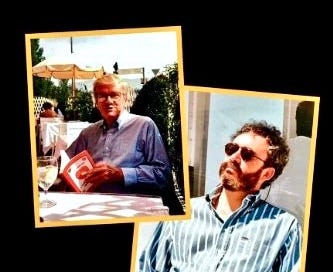On 30 August 2001, Salon.com published a story about a lawsuit filed against The Circus. If you googled my name from that day forward, you would discover my partnership with a former top CIA official—and my secret life as an undercover operative was toast.
(That revelation was probably not lost on the Russian intelligence services. And may have sealed Edward Lee Howard’s fate. The Russians could have easily believed Howard was wittingly selling them out to me as part of a deal to repatriate himself to the USA.)
Fortunately, I had completed damage control by that date and no operations were compromised (with one exception).
Two months earlier, I had relocated from Washington, D.C. to Montecito, California, where I planned to lay low.
I continued to talk with Clair three times a week, sometimes laughing our way though the legal-atrics in which we were compelled to engage—a case that would take eight years to resolve and prove to be a wonderful learning experience.
Walking down Coast Village Road in Montecito, I saw Jonathan Winters, the venerable comedian, walking toward me.
Knowing that Winters lived in Montecito, Clair tongue-in-cheek tasked me with organizing lunch for the three of us. Clair had reached the point in life where he did not care to meet new people, not least because, with macular degeneration, he could not see them well.
Winters—one of Clair’s favorite entertainers—was the sole exception.
Atop his square head, the madcap Winters wore a wide-brim cowhide hat and a fisherman’s vest that girdled his hefty paunch.
“Mister Winters?”
He stopped, squinted at me, like, do I know you?
“I just moved here from our nation’s capital,” I said. “A good friend of mine there used to run the CIA. The only ambition he has left is to have lunch with you one day.”
Winters narrowed his eyes into mine. “CIA, you say? Hmmm—they’re scary people.”
I pulled out my cell phone and tapped Clair’s number in Bethesda.
Clair answered.
“Hold on,” I said, before handing the phone to Jonathan. “Here he is, Mister Winters.”
Jonathan accepted the phone and held it to his ear. “So you used to run the CIA? Oh, it was your twin brother? Yep, I had one of those too. I don’t know if he was drunk or stupid, probably both. Huh? No, the only thing I have against gays is parades. You’re in Washington, huh?”
They yakked like old friends for three minutes, until Winters said goodbye and handed me my phone.
“So,” I said to Winters. “We’ll have lunch when my friend comes to town?”
“You’re on.” He wrote out his phone number.
Further down the street, I reconnected to Clair. “Did you enjoy that?”
“Yeah. Who was that guy?”
“What do you mean who was that guy? That was Jonathan Winters!”
“What?”
“He’s ready to have lunch with you. If I bump into John Cleese [also a Montecito resident at the time], we’ll make it a foursome.
“That was Jonathan Winters?”
“Of course, who’d you think?”
“I don’t know. He was very funny. I thought it was some old CIA guy you dug up. Jonathan Winters? How did you meet him?”
“On the street.”
“On the street?” For a guy who once ran CIA, Clair was not with it this day—probably because Washington was hotter than an extra small girdle on the circus fat lady.
“Yeah, he was walking down the street. I introduced myself, called you and handed him the phone.”
“I can’t believe it,” said Clair. “I just talked to Jonathan Winters on the phone? You just made my day—no, my year!”
“Was he funny?”
“Funny? He was hilarious!”
“What else is happening in DC?”
“It’s one of those days when you draw all the curtains, turn out the lights and run air conditioning to the max. How about there?”
“Sunny, 73 degrees, an ocean breeze.”
“Are you ashamed of yourself yet?”
The film Spy Game got released and I called Clair to tell him about it. (We often exchanged notes on books and new movies.)
“Our friend Jack Platt [a former CIA operations officer] says it’s about you and me—but that Robert Redford and Brad Pitt are better looking.”
Clair laughed. “He got that right.”






Wow!